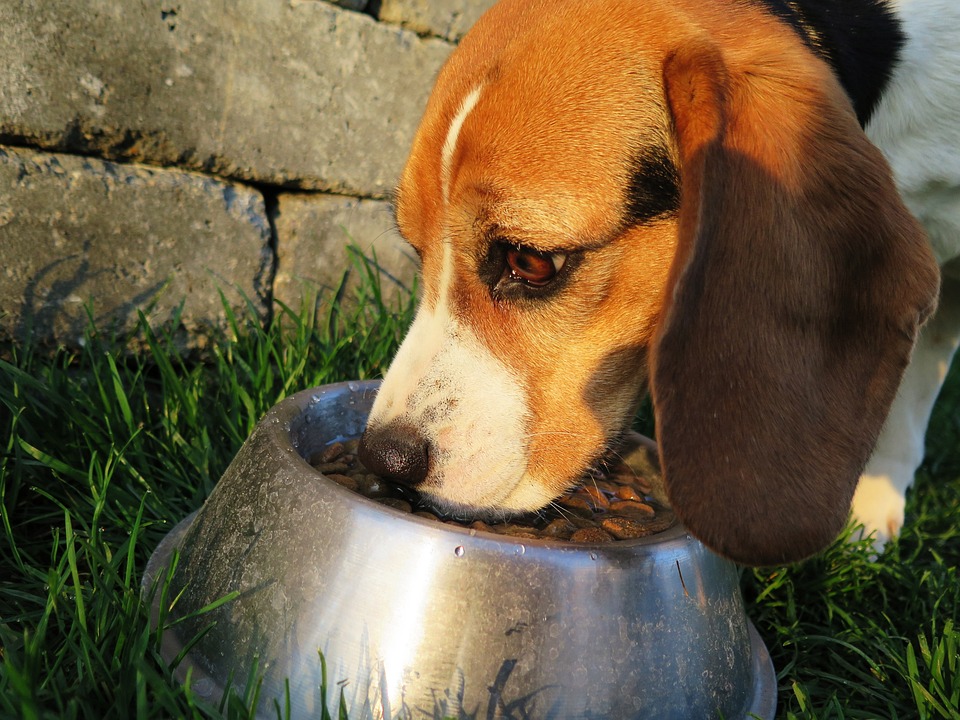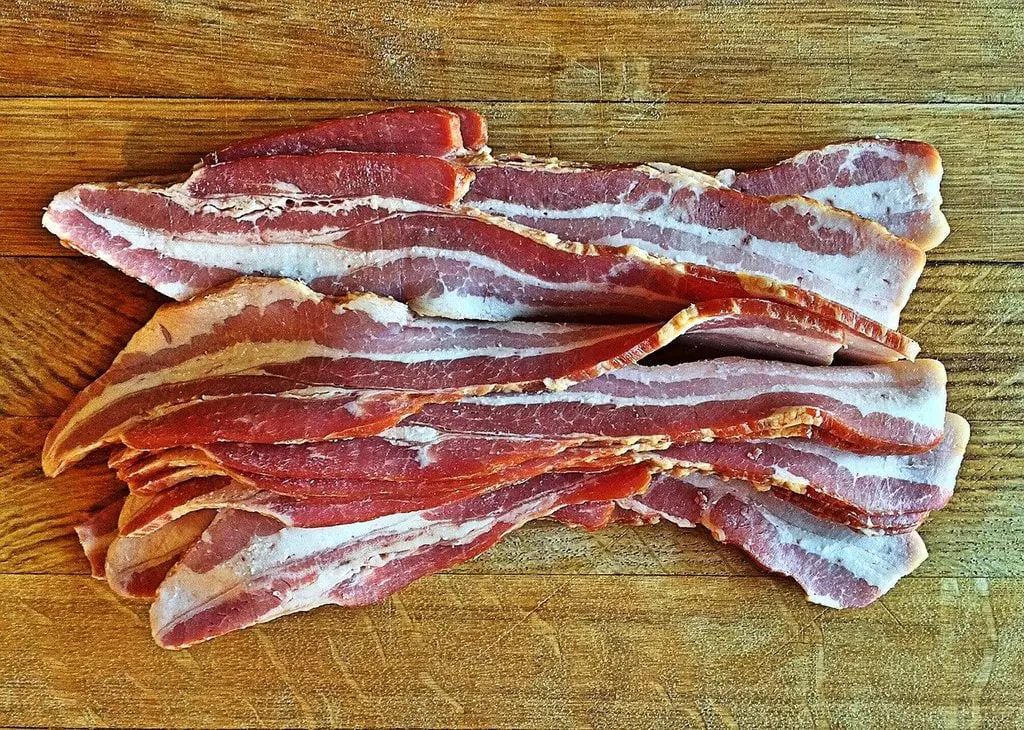Eating meat is natural for dogs, and high-performance dogs, like sled dogs, have been fed certain raw meats for years. It has recently become popular with some owners to feed domestic dogs raw meat, including “dog snacks” like raw bacon, but can dogs have raw bacon?
Dogs should not eat raw bacon because it is a fatty, high-salt-content food, which a dog’s stomach cannot always handle. Eating large amounts can cause serious, potentially fatal, health problems, such as pancreatitis, worms, and bloating, also making the dog a potential threat to public health. Occasional consumption might not be harmful but is not worth the risk.
In this article, I’ll explore what veterinarians advise and how their recommendations align with current scientific research in this regard. I’ll also look at why some dog owners believe domestic dogs can eat a raw-meat-based diet (RMBD).
Why Domestic Dogs Should Not Have Raw Bacon
According to most ongoing research, it is not good practice to give your dog raw bacon, as it could cause indigestion and many other more serious problems for your dog, such as pancreatitis, bacterial or parasitic infections, and bloating.
Pancreatitis
Most veterinarians agree that, in the long run, it is not good for a dog’s health if it is regularly fed raw bacon. One potentially life-threatening disease resulting from a high-fat diet is pancreatitis (source).
Pancreatitis disrupts your dog’s ability to digest food and absorb essential nutrients. If the pancreas isn’t able to do its job, uncomfortable and even dangerous symptoms could arise. The most common clinical signs in dogs include diarrhea, vomiting, and fever.
Small dogs are more affected by pancreas gland inflammation, but large breeds are also prone to this disease, and pancreatitis can be fatal if not properly treated.
Bacterial Infections
Raw meats, in general, are likely to carry bacteria and should always be considered as contaminated. Salmonella, E. coli 0157, campylobacter, and listeria are the most common bacteria found in raw bacon (source).
Infections caused by these bacteria are often diagnosed in dogs with symptoms including abdominal cramps, watery or bloody diarrhea, and vomiting.
Parasitic Infections
The roundworm parasite larvae trichinella spiralis causes an infection known as trichinosis in humans, and this can also be transmitted to dogs and by dogs. Raw pork of any kind is likely to include these parasites (source).
Worse, when the dog’s food is excreted, the parasites are ready for further transmission to other pets or even humans.
According to Dr. Rachel Strohmeyer at Colorado State University, this might potentially have public health implications for other animals and humans using the same surfaces and areas as the infected dog (source).
Trichinosis causes many problems for infected humans — headaches, fevers, swelling of the face and eyes, itchy skin, and diarrhea are some of the symptoms. To prevent such a contamination cycle, simply stop feeding your dog raw pork.
Bloating & Gastric Dilation Volvulus
As raw bacon is high in salt content, it is potentially poisonous to dogs. It can also cause dehydration and upset stomach. Because of dehydration and extreme thirst, the dog might drink excessive amounts of water, resulting in bloating.
As the dog over-drinks, the dog’s stomach can fill with too much fluid and gas, putting pressure on the internal organs and causing the stomach to twist. This condition is known as gastric dilation volvulus, which, in extreme cases, can be fatal.

What About Other Raw Meat?
According to Dr. Strohmeyer, feeding your dog raw beef, lamb, chicken, or turkey is just as bad as feeding it raw bacon. Her tests isolated non-specific E. coli from all raw meat products.
Many of the raw products also contained Salmonella enterica. The parasite larvae trichinella spiralis, which can be found in raw bacon, is also present in most other raw meat.
When raw meat is fed to a dog, it is not only the dog that is affected but all other pets and humans in contact with the dog.
Both the Canadian Veterinary Medical Association and the American Animal Hospital Association, AVMA, discourage the use of raw animal protein in dog diets. The Delta Society has the policy to exclude dogs on an RMBD diet from their Pet Partners Programs because of the risk of contamination (source).
Are There Benefits to a Raw-Meat-Based Diet?
Ram-meat-based diets or RMBDs are gaining in popularity. Sled dogs and racing greyhounds are often fed RMBDs, and such diets are known to produce shinier coats, higher energy levels, and healthier teeth and skin (source).
Many raw-meat-based diets are developed based on the premise that a modern domestic dog’s metabolic system doesn’t differ from wild dogs. This theory received a boost in 1993 when veterinarian Ian Billinghurst published the book Give Your Dog a Bone (source).
Some commercialized dog foods even use raw meat, as well as raw eggs, vegetables, dairy, and whole or ground bones. Many owners began to favor these options as news emerged about the contamination of other commercialized dog food. For more on commercialized dog food, read our article, “Do Dogs Like Dog Food?”
However, many nutritionists still question the real benefits of RMBDs, and the commercialized dog foods based on raw meat are subject to the same bacterial and parasitic issues. The FDA has issued warnings and guidelines concerning the potential health risks to you and your pet (source).
Proponents of RMBDs claim that these concerns are overblown and that pet owners should simply use many of the same precautions as they do when preparing raw meats to cook. They also point out that RMBDs are not suited to small dogs, puppies, or older dogs with health issues, including liver issues or pancreatitis.
Final Thoughts
Nutritionists and veterinarians agree that there are significant health risks in feeding dogs raw bacon or raw-meat-based diets. Even cooked bacon will be harmful to your dog unless done in moderation.
Perhaps the occasional snack will cause no harm, especially for larger, healthier dogs, but a steady diet of raw meat, particularly fatty cuts such as bacon, can eventually cause problems like pancreatitis, bacterial infections, or parasite infections, and the salt can cause bloating.



0 Comments